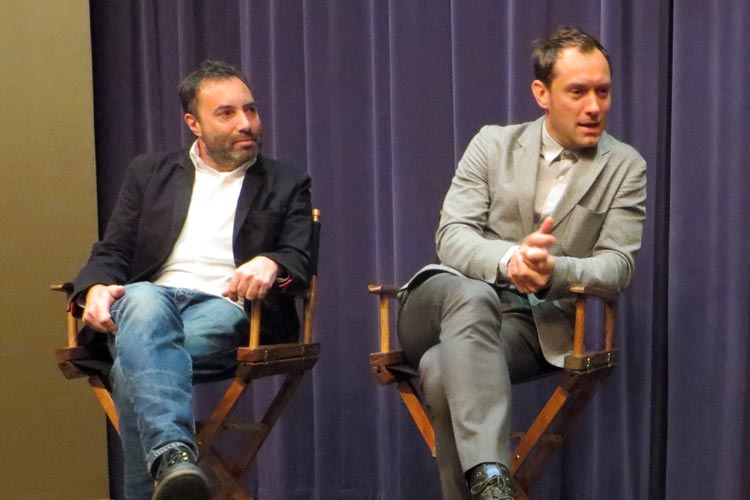The following questions and answers are excerpted from a conversation that followed the NBR screening of Dom Hemingway.
Mr. Law, when you play a character like this, what does that do to you over the duration of the production?
Law: Well, you pick up a lot of unhealthy habits! I was very ready to let him go, when we wrapped.
Shepard: Sad to let him go!
Law: Sad… but I was ready, because I felt so unhealthy. I just ate, and drank, and smoked for months. There was a wonderful confidence he gave me; a level of bravado; I felt like I kind of ruled the world, stomping around with those muttonchops. He allowed for a wonderful release. But he didn’t feel like he fit into the real world. Physically, I was tired… I felt very heavy.
Shepard: Jude’s not saying this, but on the last day of the shoot, he said, “I’m going to bury Dom.” And he physically… if you go to the Isle of Man, where we shot for two weeks, there’s a Dom Hemingway cross in the ground!
Law: We took all of the prosthetics (the nose, the hair-piece, the teeth), I shaved everything off, I took a beer, some cigarettes, his jewelry… and I put all of it in a shoebox and buried him.
Shepard: We had an actual funeral. And it was sad!
Law: It was sad. But it was the only way to purge myself: I had to leave him.
“I’m not trying to make a movie that’s easy for anyone.”
One intriguing element of the film is the score, particularly in the cemetery scene.
Rolfe Kent did the score, and it’s very interesting, because Rolfe does a lot of comedies: He’s worked with Alexander Payne and Jason Reitman… and he’s done all of my movies. I actually met him twenty years ago at the Playboy Channel, where we were working on this weird sex comedy. And on this show, which ran for thirteen episodes, Rolfe was the house composer, Wally Pfister was the house DP, Alexander Payne, Antoine Fuqua, and I were house directors… It was this incredible group of people for this show that no one has ever seen, ever! But back to your question: Rolfe did five different versions of music for that scene. We just found it very difficult to get right. I’m lucky, with Rolfe, to be able to work with a composer that can translate my emotional directions into the final score.
In both this film and The Matador, you have a main character that is both reprehensible and likable at the same time. How do you create that dynamic?
Shepard: One of the things we talked about a lot was the fact that we cared deeply about Dom. If you care deeply about the characters you’re writing and believe they’re real human beings, then you can actually make them morally reprehensible and people will ultimately like them. And if they don’t like the character, then they’re missing the movie and I accept that—I’m not making the movie for them. I’m not trying to make a movie that’s easy for anyone. I want to find a character that’s difficult to like, and if you find the human being in the character, you care for him almost in spite of yourself: Even while the character is being awful, you find yourself rooting for them. That, I think, makes it interesting. Flawed characters, just by their nature, are very compelling.
Law: I think that, with a character as vivid as Dom, it helps you as an audience member because you can step back a little bit—he’s so clearly not like you. But at the same time, he’s dealing with issues that we all have. None of us is perfect, and in a way it’s easier to look at the human condition through a character that’s a little bit broader.

